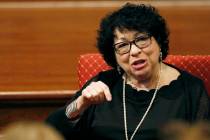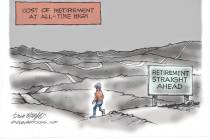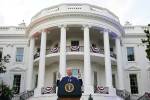Las Vegas still a middle-of-the-pack mess
A new study ranks Las Vegas the 154th best place to live in the United States.
Sounds about right.
Oh, come on now, don't be defensive. This is about reality, not PR.
Don't get me wrong. There's a lot to like about our town. I've had boots on the ground here for 20 years, and all things considered, it's been better than all right.
But it doesn't take much traveling around to realize that Las Vegas fails to stack up to many other metropolises in important ways.
The less-than-stellar ranking is included in "Cities Ranked & Rated," a numbers-heavy guidebook that evaluated more than 400 metro areas in a range of categories. The top five: Gainesville, Fla.; Bellingham, Wash.; Portland, Ore.; Colorado Springs, Colo.; and Ann Arbor, Mich.
Worst: Modesto, Calif. (Bummer for y'all up there in the birthplace of George Lucas.)
The book dings Las Vegas pretty good in key areas: health care (349th), crime (319th), transportation (256th) and education (240th). We also didn't turn any heads in the cost-of-living index at 17 percent above the national average. But Las Vegas was recognized for its strong economy (fifth!) and ample leisure offerings.
The specific numbers, however, aren't all that important. Studies of this kind -- there are many "best places" projects out there -- often don't tell the whole story. After all, the question for many people comes down to this: Would you rather live in the 24/7 neon wind sprint that is Las Vegas or the snowy snooze-fest in sixth-ranked Ogden, Utah?
Obviously, a whole lot of people choose Las Vegas. Over the past 20 years, 5,000 to 8,000 people have moved here each month. They come for the jobs. They come for the nightlife. They used to come for the low cost of living.
What isn't mentioned often enough is that about half that many leave Las Vegas each month.
Why are they fleeing? Every story is different, of course, but the decisions are often related to those factors accounting for our 154th ranking.
My sympathetic view:
Las Vegas is young, impulsive and carefree, rather than mature, steady and responsible. It is gawky, unwieldy, a hurtling object crashing through the thicket. But over time, Las Vegas will grow up, come to realize it's not going to dry up and blow away next week, understand that there's more to building a great city than slot club promotions and club events starring Kevin Federline.
My cynical view:
Las Vegas is not really a city at all. It's a sprawling support system for the Strip resorts, a factory town of second-chance worker bees, many of whom are too apathetic, transitory and self-centered to care about civic values such as good schools, smart planning, adequate health care and culture.
Actually, these views are not incompatible. Both are true.
Longtime residents complain about today's Las Vegas. Too many people. Too much traffic. Too much crime. But most of their arguments have nothing to do with Las Vegas in particular. They would have the same opinion had they experienced rapid growth in Los Angeles or Phoenix.
The issue isn't bigness. Thanks to American demographic shifts, plus the efforts of people like Howard Hughes, Kirk Kerkorian and Steve Wynn, it was practically inevitable that Las Vegas eventually would eclipse 2 million people. The issue is whether this bigger Las Vegas stacks up against other big communities.
In many respects, it doesn't. Our schools are sorely underfunded. Our transportation system is woefully inadequate. We don't have enough police officers to fight crime. Our emergency rooms are overloaded. We need more ball fields and swimming pools to serve the juvenile hordes. We do a cruddy job of caring for the needy. You know the litany.
But our bigness also breeds positives. A diverse job market. More entrepreneurial opportunities. More sophisticated educational programs. More cultural offerings. More good restaurants. If you like these sorts of things, modern Las Vegas covers most of the bases.
Still, on balance, we're 154th. And we won't start climbing the list until we do three things:
1. We have to care that we're ranked 154th. If we don't care, it's the height of hypocrisy to complain about the traffic, the schools or the emergency rooms.
2. We must dump the fast-buck, boom-and-bust mentality. Las Vegas is here to stay. It will not suffer the same fate as Nevada's 19th century mining towns gone ghost. And because we aren't going anywhere, we don't have to embrace every two-bit scheme that comes through town. We can say no once in a while. Take a longer view, making well-considered plans to improve Las Vegas not over the next six months but over the next couple of decades.
3. Make an extraordinary commitment to education. A strong school system is the foundation of everything. Among other benefits, it produces good citizens, who enhance the political process, and quality workers, who make it possible to attract more diverse industry. Want to lower the crime rate? Improve the educational system.
Good public education is expensive, but if we want to build a better community, we can't be satisfied with the dribs and drabs grudgingly doled out by the governor and state Legislature. This commitment has been made in plenty of other places, and they are better off for it.
Las Vegas is often called a can-do town. Let's show 'em we can build not only great pleasure palaces but a great city around them.
Geoff Schumacher (gschumacher@reviewjournal.com) is Stephens Media's director of community publications. He is the author of "Sun, Sin & Suburbia: An Essential History of Modern Las Vegas" and, coming in October, "Politics, Paranoia & Palace Intrigue: The Las Vegas Years of Howard Hughes." His column appears Sunday.
GEOFF SCHUMACHERMORE COLUMNS























